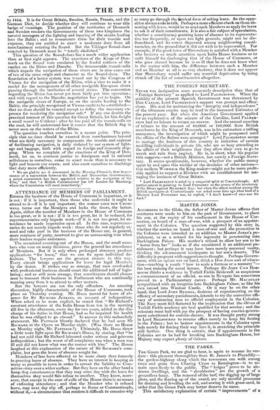ATTENDANCE OF MEMBERS OF PARLIAMENT. EITHER the business of the
House of Commons is important, or it is not : if it is important, then those who undertake it ought to attend to it—if it is not important, the sooner some new CROM• WELL turns out the Men2era and locks the doors, the better. Again, either the number Members in the House of Commons is too great, or it is not : if it is too great, let it be reduced, for supernumeraries only impede work—if it is not too great, let at- tendance be made imperative upon all. In this case, supernume- raries do not merely impede work : those who do not regularly at- tend and take part in the business of the House are, in general, mere retainers of party, reserved to give an unreasoning vote when their leaders require assistance.
The occasional counting-out of the House, and the small num- bers who vote on many divisions, prove the general lax attendance of Members. But it is only when prolonged absences produce applications "for leave," that we can fix upon individual de- faulters. The lawyers are the greatest sinners in this way. Every circuit brings applications for leave for legal Members by the dozen. It strikes one as strange, that men overloaded with professional business should court the additional toil of legis- lating ; and as still more strange, that constituents should choose men to transact their business in Parliament who are continually running away from it to attend to other matters.
But the lawyers are not the only offenders. An amusing discussion, highly characteristic of the House of Commons, took place on Thursday evening. Mr. HOGG moved for leave of ab- sence for Sir RICHARD JENKINS, on account of indisposition. When asked to be more explicit, he stated that " Sir Richard's constant attendance at the India House from ten in the morning till five in the afternoon, every day for two years, added to the dis- charge of his duties in that House, had so far impaired his health that he was obliged to go abroad." In answer to this melancholy statement, Mr. Psrxisort bluntly declared that he had seen Sir RICHARD at the Opera on Monday night. (Was there no House on Monday night, Mr. Parrisoit ?) Ultimately, Mr. Hone threw a little more light upon Sir RICHARD'S illness, by stating, that "he had not said that Sir Richard laboured under serious and grievous indisposition ; but the worst of all complaints was when a man was ill and did not know what was the matter with him." The House laughed at this explanation of the nature of Sir RICHARD'S com- plaint, but gave the leave of absence sought for. Members of late have affected to be more 'chary than formerly in granting leave of absence. They have an interest in keeping as many as possible in town in order to spread the liability to Com- mittee-duty over a wider surface. But they have on the other hand a hang-dog consciousness that they may some day wish the leave for themselves they would fain refuse to another. They know, more- over, that except in the case of calls of the House there is no means of enforcing attendance ; and that the Member who is refused leave, may next day slip off, perhaps to Rome or Constantinople, without it,—a circumstance that renders it difficult to conceive why
so many go through the farcical form of asking leave. So the oppo- sition always ends in talk. Perhaps a more efficient cheek on those ab- senting with leave, would be to send such Members as apply for leave to ask it of their constituents. It is also a fair subject of speculation, whether a constituency granting leave of absence to its representa- tive too frequently, or upon too light grounds, might not be dis- franchised, and its voters dispersed among neighbouring consti- tuencies, on the ground that it did not wish to be represented. For example, if the good town of Shrewsbury is satisfied with a Member who bestows so much attention upon India House business as to unfit himself for discharging that of the House of Commons, or who goes abroad because he is so ill that he does not know what is the matter with him, the difference between such a Member and no Member at all is so very shadowy, that it does not appear that Shrewsbury would suffer any material deprivation by being struck off the list of constituencies altogether.


























 Previous page
Previous page